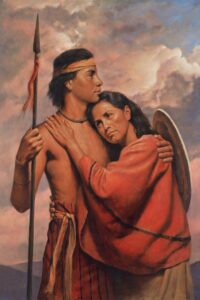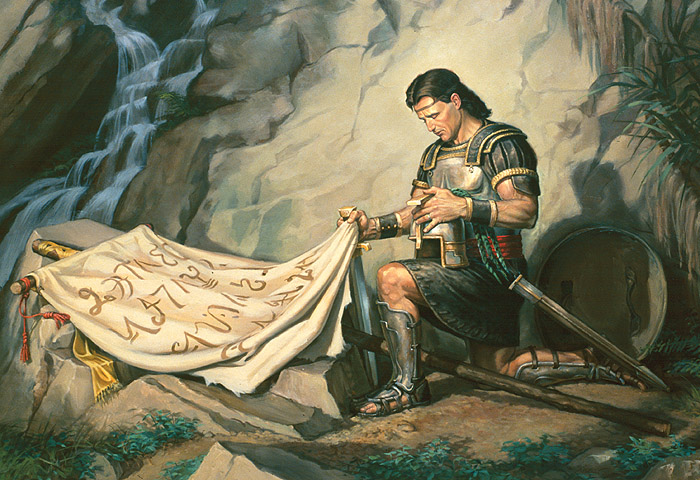To accompany your Come Follow Me study for August 12-25
This is two weeks’ worth of reading, but you will understand, enjoy, and learn more from these “war chapters” if you read and ponder them all in the same week. The “Mormon’s Message to Modern Militants” exercise will be even more fun if you also read Mormon 1-6 first.
In addition to reading Alma 43-63, you will enjoy watching the following videos on the subject:
Here is an amazing story of a modern-day miracle during the Korean War comparable to that of the stripling warriors of the Book of Mormon:
You will also enjoy consulting the related commentary from the Institute of Religion Book of Mormon Student Manual:
In addition to reading and pondering these chapters, you will enjoy reading the following article about a modern-day experience that parallels Helaman’s miraculous deliverance with his two thousand stripling warriors:
If you would like a Kahoot game related to this material which you could use for personal study or use with your family or your class, click here: https://create.kahoot.it/share/alma-43-63/b28d9069-1579-4590-9e84-ca41308706fa . To use it with a group, after clicking on this link, you will need to log into Kahoot, creating a free account if you have not done so previously, then click on the blue “Start” button. Some of the Kahoot questions may presuppose that the player has read through the suggested answers to the following Points to Ponder and at least has browsed the Institute student manual as well.
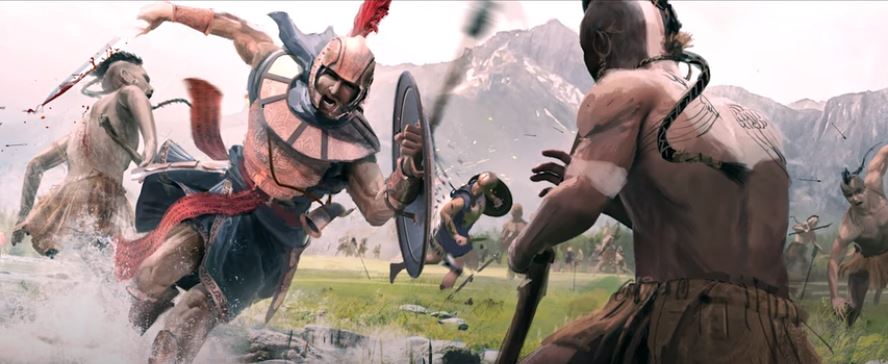
Points to Ponder in Alma 43-63
MATCHING: [One of the answers will need to be used twice.]
_____1. Agreed to conditions of peace after losing his scalp.
_____2. Chief judge whose chief captain wrongly suspected him of treason.
_____3. Led the youngest army in recorded Nephite history.
_____4. Made the first recorded American flag.
_____5. Killed three others from this list before dying violently himself.
_____6. Arranged the death of a king and married his widow.
_____7. Became king of the Lamanites after his predecessor was assassinated on New Year’s Eve.
_____8. Staged a short-lived coup in Zarahemla.
_____9. A “curious” man who may have inadvertently discovered one or more of the Polynesian islands.
_____10. Nephite general who fought against Lamanites in valley east of the river Sidon
_____11. Lamanite rebel leader who was deceived by a Nephite rebel
_____12. Received military intelligence through revelation concerning Lamanite troop movements, and later was believed to have been translated and taken to heaven without tasting death.
_____13. It was said of him that “if all men had been, and were, and ever would be, like unto” him, “the very powers of hell would have been shaken forever,” and “the devil would never have power over the hearts of the children of men.”
_____14. Beat a maid servant, who later thwarted his plans to flee to the land northward.
a. Alma
b. Amalickiah
c. Ammoron
d. Hagoth
e. Helaman
f. Lehi
g. Lehonti
h. Morianton
i. Moroni
j. Pachus
k. Pahoran
l. Teancum
m. Zerahemnah
15. The Book of Mormon in its entirety records about 2600 years of history on this continent in 531 pages, for an average of nearly 5 years per page. By contrast, the record of the long war recorded in Alma 43-62 occupies an average of about how many years per page?
a. .3
b. 1.2
c. 3.1
d. 15
16. What do we know about Hagoth? Is he an ancestor of the Polynesians?
17. Complete the following Mormon’s Message for Modern Militants exercise.
MORMON’S MESSAGE TO MODERN MILITANTS
OR, WHY IS THERE SO MUCH ABOUT WAR IN THE BOOK OF MORMON?
First time readers of the Book of Mormon may be surprised to find that the book is not simply a religious treatise but to a significant extent is a chronicle of conflict. By actual count, over one hundred of its 531 pages deal specifically and in detail with war. The word “war” itself, with its derivatives, occurs a total of 171 times in the Book of Mormon. There are an additional 147 references to the word “battle” in its various forms and an equal number to the word “contention.” “Slay” and “slaughter” appear 284 times and “army” or “armies” show up a grand total of 294 times! The purpose of this exercise is to explore possible reasons for Mormon’s inclusion of so much material related to war and to analyze the teachings of Book of Mormon prophets concerning the following four questions: (1) When is war justified? (2) What rules govern the righteous conduct of war? (3) What must a nation do in order to win a war? (4) What effects, good or bad, can a righteous people expect from war?
First, the reader is invited to ponder the following true/false “exam” on the subject. Fifteen of the statements concerning Nephite attitudes toward war, peace, and national security are true and fifteen are partially or totally false. The balance of the paper consists of my own answers and explanations relative to each statement. The reader may wish to compare his own score with the following suggested standard:
- 26 or more right = Excellent! Mormon would be proud of you.
- 15-25 right = Not bad, but Mormon would want you to reread his book.
- 14 or fewer right = There’s a great new adventure awaiting you in the Book of Mormon.
Admittedly, these true/false statements collectively would make a poor exam in an academic setting, since true/false questions are notorious for their tendency to reward the lucky while they penalize the thoughtful. They may also give undue prominence to such qualifying words as always and never. And there is the danger that the student will remember a false statement rather than the explanation as to why it is false. But if the reader will approach the “exam” in the spirit of fun and give more attention to the explanation than to the simple “answer” in each case, he can have both an enjoyable and a profitable experience.
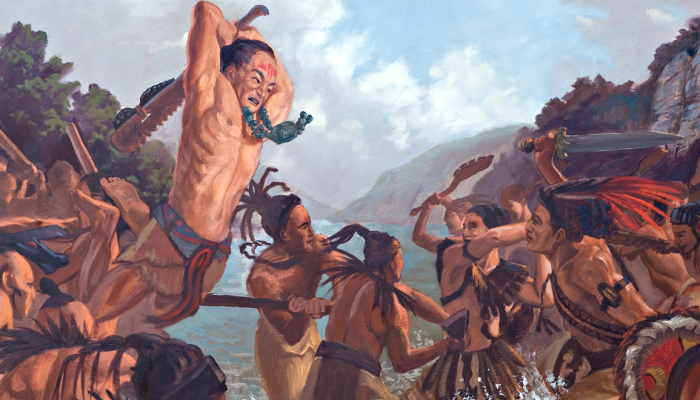
WHAT’S YOUR BMMQ?
(Book of Mormon Military Quotient)
1. The Book of Mormon probably contains so much detail concerning war because it was edited by a military man (Mormon) who was more interested than we are in that sort of thing.
2. Nephite prophets taught that we can expect war to continue until men finally recognize there is nothing really worth fighting for.
3. The Book of Mormon teaches that a truly righteous person would rather lay down his life than take up arms even in self-defense.
4. The righteous Gideon taught that bondage was preferable to death.
5. The Book of Mormon teaches that armed revolution is not a proper response even to an oppressive government.
6. Captain Moroni would probably have had little difficulty accepting the idea that “all is fair in love and war.”
7. The righteous Nephites occasionally launched a preemptive attack on the Lamanites, when they knew the Lamanites were planning to attack them, in order to minimize the loss of life on both sides.
8. Once the Nephites went on the offensive against the Lamanites, Mormon never again consented to be their leader.
9. Both the ancient Nephites and Israelites understood that the Lord’s Law of Warfare prohibited fighting until the fourth time their enemies had come against them.
10. Nephite military leaders invariably refused to kill Lamanites while they were drunken or asleep.
11. Moroni felt such deceitful tactics as espionage and subterfuge could disqualify the Nephites for the divine protection they would need in battle.
12. The Nephites eventually released most of their prisoners of war, but they occasionally executed some of them.
13. The Nephites, during their years of righteousness, viewed the killing of Lamanite aggressors as an unpleasant but necessary duty.
14. Nephite armies were composed exclusively of volunteers.
15. Moroni’s punishment for conscientious objectors was death.
16. The entire Nephite population had a prominent voice in the appointment of their military leaders.
17. Even though they trusted in the Lord to deliver them, the Nephites devoted considerable time and resources to weapons production and defense systems.
18. Even though the Lord blessed the righteous Nephites in battle, such help was largely spiritual rather than temporal, and was typically so gradual as to be almost imperceptible except in retrospect.
19. On occasion the Lord gave the Nephites detailed revelation concerning the location, plans, and tactics of the Lamanite army.
20. The Book of Mormon teaches that when the majority in a nation chooses that which is evil, that nation can expect the judgments of God to come upon it with great destruction.
21. The Book of Mormon teaches that a dedicated righteous minority can forestall destruction of a nation even when the majority is evil.
22. Qualifications for the position of chief captain among the Nephites seem to have included youth, physical strength, and the spirit of revelation.
23. The Nephites found that domestic subversion was an even greater threat than foreign invasion.
24. The Book of Mormon shows that the Lord’s promise to protect the righteous is a general principle which does not necessarily apply in specific cases.
25. During a notable battle, Helaman led a group of 2000 young former Lamanites, all of whom were either killed or wounded in the fighting.
26. Book of Mormon prophets often welcomed war as a means of bringing wayward souls to repentance and bringing out strength of character in the righteous.
27. The Nephites were never happier, prior to the coming of Christ, than they were during the sixteen year war with the Lamanites detailed in the last chapters of Alma.
28. The Book of Mormon teaches that peace and war cannot exist simultaneously.
29. The Book of Mormon equates the Spirit of God with the Spirit of freedom.
30. The American continent still retains the promise of freedom and divine protection if its inhabitants will keep the commandments of the Lord.
POSSIBLE ANSWERS TO POINTS TO PONDER ON ALMA 43-63
MATCHING: [One of the answers will need to be used twice.]
m____1. Agreed to conditions of peace after losing his scalp.
k____ 2. Chief judge whose chief captain wrongly suspected him of treason.
e_____3. Led the youngest army in recorded Nephite history.
i_____4. Made the first recorded American flag.
l_____5. Killed three others from this list before dying violently himself.
b_____6. Arranged the death of a king and married his widow.
c_____7. Became king of the Lamanites after his predecessor was assassinated on New Year’s Eve.
j_____8. Staged a short-lived coup in Zarahemla.
d_____9. A “curious” man who may have inadvertently discovered one or more of the Polynesian islands.
f_____10. Nephite general who fought against Lamanites in valley east of the river Sidon
g_____11. Lamanite rebel leader who was deceived by a Nephite rebel
a_____12. Received military intelligence through revelation concerning Lamanite troop movements, and later was believed to have been translated and taken to heaven without tasting death.
i_____13. It was said of him that “if all men had been, and were, and ever would be, like unto” him, “the very powers of hell would have been shaken forever,” and “the devil would never have power over the hearts of the children of men.”
h_____14. Beat a maid servant, who later thwarted his plans to flee to the land northward.
a. Alma
b. Amalickiah
c. Ammoron
d. Hagoth
e. Helaman
f. Lehi
g. Lehonti
h. Morianton
i. Moroni
j. Pachus
k. Pahoran
l. Teancum
m. Zerahemnah
15. The Book of Mormon in its entirety records about 2600 years of history on this continent in 531 pages, for an average of nearly 5 years per page. By contrast, the record of the long war recorded in Alma 43-62 occupies an average of about how many years per page?
a. .3
b. 1.2
c. 3.1
d. 15
16. What do we know about Hagoth? Is he an ancestor of the Polynesians?
See the following article on the subject: https://knowhy.bookofmormoncentral.org/knowhy/why-did-mormon-mention-hagoth and enjoy the related video:
17. Complete the following Mormon’s Message for Modern Militants exercise.
ANSWERS TO MORMON’S MESSAGE TO MODERN MILITANTS
1. The Book of Mormon probably contains so much detail concerning war because it was edited by a military man (Mormon) who was more interested than we are in that sort of thing.
False. The reason (or Mormon’s inclusion of so much material on war is more likely that he, like Nephi, knew there would be “wars and rumors of wars among all the nations and kindreds of the earth” (1 Ne. 14:15) in the latter days and was convinced that there were lessons to be learned from Nephite military history which would benefit later generations facing the same issues and challenges. Moroni, who finished his father’s record, specifically told his future readers of the extent of his foreknowledge of their circumstances:
“Behold, the Lord hath shown unto me great and marvelous things concerning that which must shortly come, at that clay when these things shall come forth among you.
“Behold, I speak unto you as if ye were present, and yet ye are not. But behold, Jesus Christ hath shown you unto me, and I know your doing.” (Mormon 8:34.35.)
In view of this foreknowledge, and in view of the difficulty of engraving on metallic plates, it is difficult to believe that Mormon or Moroni would have included such extensive accounts of their feelings and experiences concerning war just because they personally found it “interesting.”
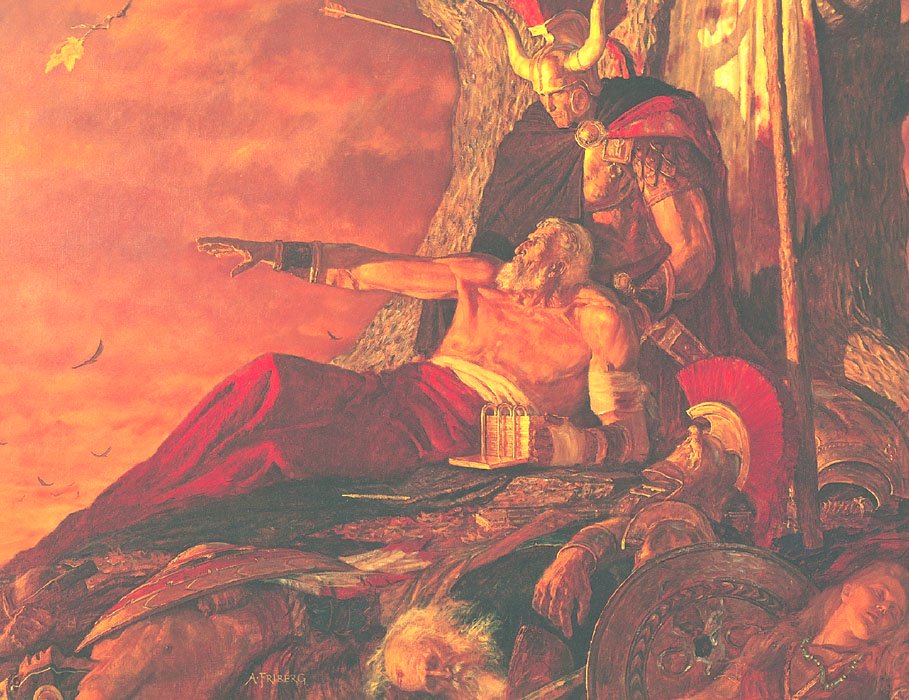
2. Nephite prophets taught that we can expect war to continue until men finally recognize there is nothing really worth fighting for.
False. One of the great lessons of the Book of Mormon is that there are things worth fighting for. The Nephites were not merely permitted but required to fight in defense of “their homes and their liberties, their wives and their children, and their all, yea, for their rites of worship and their church” (Alma 43:45). They understood that the Lord had commanded that “ye shall defend your families even unto bloodshed” (v. 47). Moroni wrote to his apparently apathetic countrymen that “except ye do bestir yourselves in the defence of your country and your little ones, the sword of justice doth hang over you; yea, and it shall fall upon you and visit you even to your utter destruction” (Alma 60:29). The righteous Ammon even taught the propriety of fighting in defense of property as he stood single-handedly against those who would have scattered Lamoni’s sheep, which had been entrusted to his care (see Alma 17:26.39).
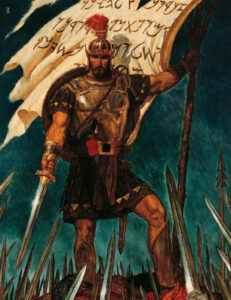
3. The Book of Mormon teaches that a truly righteous person would rather lay down his life than take up arms even in self-defense.
False. The major reason for the prevalent notion that the Book of Mormon holds up pacifism as holier than self-defense is the story of the Lamanite converts who refused to take up arms against their brethren. But this was a special case and was not intended to establish a precedent which all others were to follow. The message of the self-sacrificing Lamanite converts is not that defense is wrong but that oaths are inviolable. Nowhere is it specified that they were obliged by the Lord or by the sons of Mosiah to make such an oath never again to take up the sword. They seem to have come up with the idea on their own, feeling that in their case, since they had once been murderers, it would be safer never to take up the sword again than to risk reverting to old attitudes and invalidating their hard-won repentance. Perhaps just as a reformed alcoholic cannot safely take even a sip of alcohol, reformed killers cannot safely participate in war again. Or possibly they felt that by offering their own lives they could help atone for the lives they had taken from others. At any rate, once they had voluntarily made a promise of pacifism, for whatever reason, it was crucial that they not attempt to rescind their vow.
But it is obvious that they had no scruples against defensive warfare as a general principle. Had such been the case, they would hardly have freely sent of their substance for the support of the Nephite armies or have been willing to send off their sons, who were not bound by their oath, to fight in their stead (see Alma 24:11.19; 53:14.21). Concerning these young Lamanite warriors, Helaman makes a point of recording that “they were men of truth and soberness, for they had been taught to keep the commandments of God and to walk uprightly before him” (Alma 53:21). One would hardly expect such accolades if the younger generation were in fact departing from a higher standard of righteousness exhibited by their parents.
Further evidence that the Lord does not condemn his people for defending themselves is the fact that Book of Mormon prophets and military men alike enjoyed divine revelation both during and following their battles. Had they been in serious transgression of the Lord’s commands in their military campaigns, this would have been impossible, as “the Spirit of the Lord doth not dwell in unholy temples” (Helaman 4:24). Helaman reserved his highest praise for Moroni, a military man. By way of summary he wrote: “If all men had been, and were, and ever would be, like unto Moroni, behold, the very powers of hell would have been shaken forever; yea, the devil would never have power over the hearts of the children of men” (Alma 48:17).
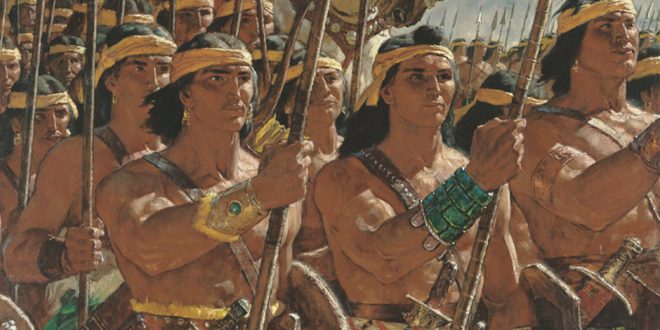
4. The righteous Gideon taught that bondage was preferable to death.
True (under some circumstances). Though Gideon was a “righteous man” (Alma 1:13), when numerous hosts of Lamanites threatened the imminent extinction of Limhi’s colony, he pleaded with King Limhi: “Let us pacify the king, and we fulfill the oath which we have made unto him; for it is better that we should be in bondage than that we should lose our lives” (Mosiah 20:22). The resulting bondage proved grievous, but it was short lived, because Limhi’s group escaped from the Lamanites and reunited with their brethren in Zarahemla.
Alma took a similar stand when a Lamanite army discovered his little city of Helam. Since he viewed defense against such formidable odds as futile, Alma pled with his people to deliver themselves peacefully into the hands of the Lamanites, from which in due time, like Limhi’s group, they would successfully escape without resort to arms.
But the more common Nephite response was illustrated by Pahoran when he wrote: “We would subject ourselves to the yoke of bondage if it were requisite with the justice of God, or if he should command us so to do. But behold he doth not command us that we shall subject ourselves to our enemies, but that we should put our trust in him, and he will deliver us.” (Alma 61:12.13.) In this spirit, Helaman’s young Lamanite warriors were praised for thinking “more upon the liberty of their fathers than they did upon their lives” (Alma 56:47). And when the Gadianton leader Giddianhi demanded that the Nephites surrender, the record speaks in glowing terms of the governor, Lachoneus, who “was a just man, and could not be frightened by the demands and the threatenings of a robber” (3 Nephi 3:12), but instead prepared his people both spiritually and militarily for the inevitable conflict.
In short, the Book of Mormon makes clear that divine revelation is necessary to know what course to take in a given crisis. Not only might the Lord on one occasion command his people to fight and on another counsel them to flee (see Alma 48:15), but under still other circumstances he might prompt them to submit to temporary bondage and await divine aid in escaping.
5. The Book of Mormon teaches that armed revolution is not a proper response even to an oppressive government.
False. Book of Mormon prophets would have readily agreed with signers of the Declaration of Independence that revolution should not be undertaken for light or transient reasons. But they did not rule out divinely sanctioned insurrections against corrupt leaders when lesser methods of gaining redress failed. The revolt against King Noah is a good example. Gideon is clearly represented as a hero in his efforts to assassinate Noah atop the tower. When a massive popular uprising finally accomplished what Gideon had attempted, no one shed any tears for the slain king, including the inspired historian who recounted the event.
Moroni took a similar view toward the recreant public officials in Zarahemla. There is no greater example of patriotism in the entire Book of Mormon than Moroni, but the Nephite commander did not equate loyalty to country with loyalty to its leaders unless those leaders had the best interests of the country at heart. When internal corruption and personal ambition caused the war effort to bog down, Moroni cited the Lord’s admonition that “the inward vessel shall be cleansed first, and then shall the outer vessel be cleansed also.” (Alma 60:23.) In his second epistle to Pahoran, Moroni told his superior, “Behold, the Lord saith unto me: If those whom ye have appointed your governors do not repent of their sins and iniquities, ye shall go up to battle against them” (Alma 60:33).
The American Revolution is another example of a divinely countenanced uprising. As Nephi had foreseen in vision, the power of God was with the colonists and the wrath of God was upon their “mother Gentiles,” even though the rebels could have averted bloodshed by continuing to suffer in silence the oppression of King George III (see 1 Nephi 13:17.18).
6. Captain Moroni would probably have had little difficulty accepting the idea that “all is fair in love and war.”
False. Moroni and other Nephite commanders understood there were rules of fair play which had to be honored even in war if the Lord’s blessings were to attend them. They were to fight with reluctance, not eagerness. (See Mosiah 29:40; Alma 48:11, 23.) They were to take their opponents as prisoners, if possible, rather than kill them. Killing enemy soldiers while they were drunk was viewed as a grave injustice. (See Alma 55:19.) Prisoners of war were to be fed and protected and held only so long as was necessary to ensure the safety of the nation. As soon as a war was ended, the vanquished army and any previously captured prisoners of war were to be allowed to return to their homeland in peace, apparently with no conditions imposed. (See Alma 55:27; 57:15; Helaman 1:33.) Prisoners who agreed to a covenant of peace could be released sooner (see Alma 62:16.17).
A notable example of Nephite benevolence is the short-lived conflict with the Lamanite chieftain Zerahemnah. Once Moroni and Lehi had surrounded Zerahemnah’s troops and beheld their terror, Moroni commanded his men to stop the bloodshed. He then extended an offer of peace to Zerahemnah, proposing to let him and his men go free if they would but deliver up their weapons and covenant never to wage war on the Nephites again. Zerahemnah accepted the first condition, but stubbornly rejected the second. He was willing to give up his arms and surrender his troops, but he refused to take an oath which he would later break. But Moroni was equally determined not to let his captives leave without making such an oath. Rather than take advantage of the now unarmed Lamanite army, he returned their arms and proposed continuing the conflict to its bitter end. During the ensuing battle Zerahemnah lost his scalp. The military superiority of the Nephites soon took its toll. After much bloodshed, even Zerahemnah came to understand what a desperate situation he was in and finally accepted Moroni’s conditions. After turning in their arms and accepting the stipulated non-aggression pact, the Lamanite warriors were free to go, with no punishment inflicted nor reparations required. (See Alma 43:44.)
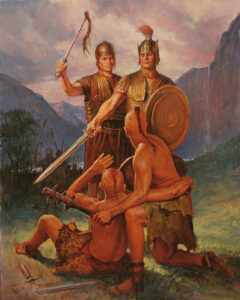
7. The righteous Nephites occasionally launched a preemptive attack on the Lamanites, when they knew the Lamanites were planning to attack them, in order to minimize the loss of life on both sides.
False. On one occasion when the threat from the Gadianton band was so great that it became necessary to gather the entire Nephite nation into a fortified area for safety, there was popular support for the idea of launching a preemptive strike against the robbers. But Gidgiddoni, the inspired Nephite leader, replied: “The Lord forbid; for if we should go up against them the Lord would deliver us into their hands; therefore we will prepare ourselves in the center of our lands, and we will gather all our armies together, and we will not go against them, but we will wait till they shall come against us; therefore as the Lord liveth, if we do this he will deliver them into our hands.” (3 Ne. 3:21.) Only in the days of Mormon, when all, except for a handful of Nephites, had turned completely away from the Lord’s commandments, did the Nephites engage in offensive warfare.
8. Once the Nephites went on the offensive against the Lamanites, Mormon never again consented to be their leader.
False. When the Nephites went on the offensive, boasting in their own strength and seeking vengeance against the Lamanites, “Mormon did utterly refuse from this time forth to be a commander and a leader” of the people. (Mormon 3:11.) The Nephites went ahead with their offensive measures and “began to be smitten” (Mormon 4:4). Soon they began to be destroyed and never again would have power over the Lamanites, “but began to be swept off by them even as a dew before the sun.” (Mormon 4:18.) Since the Nephites were now necessarily fighting a defensive war once again, Mormon was able and willing to resume his service as commander of the army, though it was without hope, given the continuing iniquity of his people. (See Mormon 5:1-2.)
9. Both the ancient Nephites and Israelites understood that the Lord’s Law of Warfare prohibited fighting until the fourth time their enemies had come against them.
False. Both on an individual as well as a national level, the Lord’s people were to exercise great patience and restraint in the face of provocations. If an enemy repented and asked forgiveness after each offense, he was to be forgiven seventy times seven times. Even if he didn’t repent, it was hoped that the righteous would forgive liberally the first three times that he came against them. The Lord’s law to the ancients was that his people were not to “go out unto battle” against any nation except by divine command, which commandment normally would come only after they had patiently endured three attacks and a fourth attack was imminent. (See D&C 98:33-45.)
But it is clear that this “law of the third offense” was designed only to prevent offensive warfare, or wars of revenge, not to forbid normal defense. If it had been necessary that the Lord’s people submit passively to an armed attack on three different occasions before they could raise an arm in their own defense, there would have been little opportunity for a third offense, as the aggressor could easily have completed his work of destruction in the first battle. On one occasion, recognizing this, the Nephite armies prepared to ambush the approaching Lamanite army, even though thus far there had been no bloodshed on either side. (See Alma 43:1-35.)
10. Nephite military leaders invariably refused to kill Lamanites while they were drunken or asleep.
False. Though it seems that righteous Nephite leaders such as Moroni generally refused to kill common Lamanite soldiers when they were drunk (Alma 55:19), they did not always have the same reservations against executing aggressive Lamanite leaders whom they considered responsible for the war, even though such leaders might be asleep. We find no words of condemnation for Teancum, who twice assassinated Lamanite commanders while they were sleeping, losing his own life the second time. Instead, Helaman praises Teancum as a “man who had fought valiantly for his country, yea, a true friend to liberty.” (Alma 62:37)
11. Moroni felt that such deceitful tactics as espionage and subterfuge could disqualify the Nephites for the divine protection they would need in battle.
False. Since the Nephites had no aggressive aspirations, they considered it no sin to defend their lands, liberty, and church through strategem. They regularly sent spies, used decoys, and set traps, as circumstances permitted. (See Alma 43:23-34; 52:21; 56:30; 62:20.)
12. The Nephites eventually released most of their prisoners of war, but they occasionally executed some of them.
True. The Nephites normally released enemy soldiers following a war, permitting them to “depart the land in peace.” (Helaman 1:33; Alma 44:20; 62:15-17.) Captured Gadianton robbers were jailed temporarily in an effort to reform them. Those who were willing to repent and covenant to kill no more were set free. But Zemnarihah, their leader, was taken and hung on a tree (3 Nephi 4:28), evidently with no effort being made to rehabilitate him. Evidently the Nephites distinguished between those who in war were merely following orders and those who issued the orders. Just as murderers at the individual level were considered deserving of death, so too were those who promoted armed conflict at the international level.
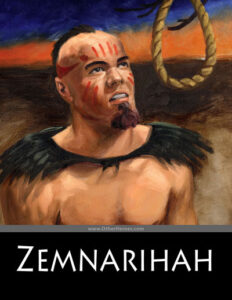
13. The Nephites, during their years of righteousness, viewed the killing of Lamanite aggressors as an unpleasant but necessary duty.
True. Helaman tell us: “Now, they were sorry to take up arms against the Lamanites, because they did not delight in the shedding of blood; yea, and this was not all—they were sorry to be the means of sending so many of their brethren out of this world into an eternal world, unprepared to meet their God. Nevertheless, they could not suffer to lay down their lives, that their wives and their children should be massacred.” (Alma 48:23-24)
14. Nephite armies were composed exclusively of volunteers.
False. Sometimes voluntary means were sufficient, as when Moroni marched throughout the countryside with his banner unfurled, inviting all who were willing to fight in defense of their families, freedom, and religion to rally to the cause (see Alma 46:11.21). But Moroni recognized that under other circumstances it could be necessary to use stronger measures. For example, when large numbers of kingmen refused voluntarily to aid in the war effort against the Lamanites, Moroni not only prevented their giving aid and comfort to the enemy but actually compelled them “to hoist the title of liberty upon their towers, and in their cities, and to take up arms in defence of their country” (Alma 51:20). Getting volunteers was the ideal, but the Nephite leaders were sufficiently pragmatic to realize that the temporary abridgment of the freedom of a few draftees was preferable to the defeat and subjugation of the entire nation.
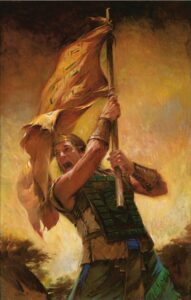
15. Moroni’s punishment for conscientious objectors was death.
False. Some who refused to fight in the Nephite cause were executed. But they were not pacifists or even fence-sitters but “dissenters” who were actively supporting the enemy (see Alma 51:15.19; 62:9.10). However, legitimate conscientious objectors, for whom fighting really was contrary to their principles, were not only tolerated but encouraged to stay true to their commitments (see Alma 53:11.15).
16. The entire Nephite population had a prominent voice in the appointment of their military leaders.
True. Moroni, for example, was “appointed by the chief judges and the voice of the people” (Alma 46:34), just as it was the “people of Nephi” who appointed Mormon generations later (see Mormon 2:1). It appears likely that the role of the people was to sustain, rather than nominate, much as is the case with ecclesiastical appointments in the Church today.
17. Even though they trusted in the Lord to deliver them, the Nephites devoted considerable time and resources to weapons production and defense systems.
True. The Nephites recognized that faith without works was not only dead but potentially deadly. “Do ye suppose that the Lord will still deliver us,” Moroni asked, “while we sit upon our thrones and do not make use of the means which the Lord has provided for us?” (Alma 60:21). From the time Nephi used the sword of Laban as a model for additional swords, the Nephites emphasized the necessity of weapons production and good military strategy in addition to righteousness if they expected to win against their numerically superior foe. The blending of military preparation with reliance on divine aid is well illustrated in Jarom 1:7.9, where both are given as reasons for the Nephite victory.
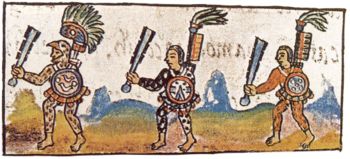
18. Even though the Lord blessed the righteous Nephites in battle, such help was largely spiritual rather than temporal, and was typically so gradual as to be almost imperceptible except in retrospect.
False. When righteous and prepared, the Nephites consistently inflicted more military losses than they suffered (see Mosiah 9:18-19; Alma 2:19; 49:23-24; 57:25). And at times the Lord’s assistance could be both obvious and dramatic. In the Nephites’ encounter with Zerahemnah’s forces, “in the selfsame hour that they cried unto the Lord for their freedom, the Lamanites began to flee before them” (Alma 43:50). More than once the Lord revealed in detail the location, route, and proposed destination of the Lamanite army, with specific instructions on how to counteract their designs (see Alma 16:5.6; 43:24). The Nephites fully expected that if they were worthy, God “would prosper them in the land; yea, warn them to flee, or to prepare for war, according to their danger; and also, that God would make it known unto them whither they should go to defend themselves against their enemies” (Alma 48:15.16). We are told, in short, that “those who were faithful in keeping the commandments of the Lord were delivered at all times, whilst thousands of their wicked brethren have been consigned to bondage, or to perish by the sword, or to dwindle in unbelief, and to mingle with the Lamanites” (Alma 50:22). No doubt there were times when the Lord’s hand was less visible, but it would be a serious exaggeration to say that his help was confined to the spiritual realm or was “typically so gradual as to be almost imperceptible.”
19. On occasion the Lord gave the Nephites detailed revelation concerning the location, plans, and tactics of the Lamanite army.
True. See Alma 16:5.6 and Alma 43:24.
20. The Book of Mormon teaches that when the majority in a nation chooses that which is evil, that nation can expect the judgments of God to come upon it with great destruction.
True. See Mosiah 29:26, 27.
21. The Book of Mormon teaches that a dedicated righteous minority can forestall destruction of a nation even when the majority is evil.
True. Amulek told the people of Ammonihah “if it were not for the prayers of the righteous, who are now in the land, that ye would even now be visited with utter destruction (Alma 10:22). Disregarding Amulek’s advice, the Ammonihahites cast out the righteous and shortly thereafter were annihilated by the Lamanites. Both Helaman and Samuel asserted that the Nephites of their day had similarly been spared because of a righteous minority (see Alma 62:40; Helaman 13:13). Not until the time arrived that “every heart was hardened” (Mormon 4:11) did the Lord permit the destruction of the entire Nephite nation.
22. Qualifications for the position of chief captain among the Nephites seem to have included youth, physical strength, and the spirit of revelation.
True. Since Nephite chief captains typically led, rather than sent, their troops into battle, it was important that they be able to hold their own in hand-to-hand combat. Moroni was selected at age twenty- five and was ready for retirement fourteen years later. Moroni’s son and successor, Moronihah, could not have been much more than a youth himself at the time of his appointment, though the record is silent as to his precise age. Perhaps most spectacular of all, Mormon at the tender age of fifteen became leader of the entire Nephite army. He records, “Notwithstanding I being young, was large in stature; therefore the people of Nephi appointed me that I should be their leader” (Mormon 2:1). We are further told that “it was the custom among all the Nephites to appoint for their chief captains, (save it were in their times of wickedness) some one that had the spirit of revelation and also prophecy” (3 Nephi 3:19). It may be that even in times of general wickedness the Nephites appreciated the military implications of Mormon’ spiritual qualifications in addition to his physical prowess.
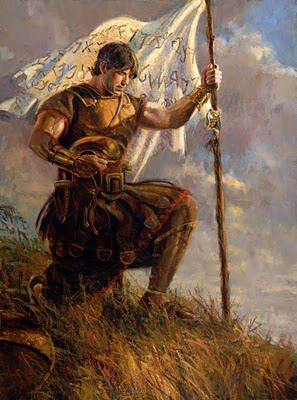
23. The Nephites found that domestic subversion was an even greater threat than foreign invasion.
True. When united and worthy, the Nephites had little problem dealing with a foreign foe. But when dissensions, disloyalty, and wickedness arose in their own ranks, they thought themselves in great peril and sometimes suffered great losses (see Alma 53:9; Helaman 1:15.20; 4:11.13). Mormon tells us “it has been their quarrelings and their contentions, yea, their murderings, and their plunderings, their idolatry, their whoredoms, and their abominations, which were among themselves, which brought upon them their wars and their destructions” (Alma 50:21). Moroni also taught that it was not Lamanite aggression but the secret combinations among the Nephites which were the ultimate reason for the downfall of his people (see Ether 8:21).
24. The Book of Mormon shows that the Lord’s promise to protect the righteous is a general principle which does not necessarily apply in specific cases.
True. While in times of righteousness the Nephites as a nation consistently fared better than the Lamanites in battle, they almost always suffered at least some losses. Moroni emphatically denied that those who died in defense of their lands and freedom were any less worthy than their associates. “The Lord suffereth the righteous to be slain,” he wrote, “that his justice and judgment may come upon the wicked” (Alma 60:13).
25. During a notable battle, Helaman led a group of 2000 young former Lamanites, all of whom were either killed or wounded in the fighting.

True. “There was not one soul of them who did perish; yea, and neither was there one soul among them who had not received many wounds” (Alma 57:25). While this may be considered a trick question, it reminds us that the young Lamanite warriors were far from unscathed.
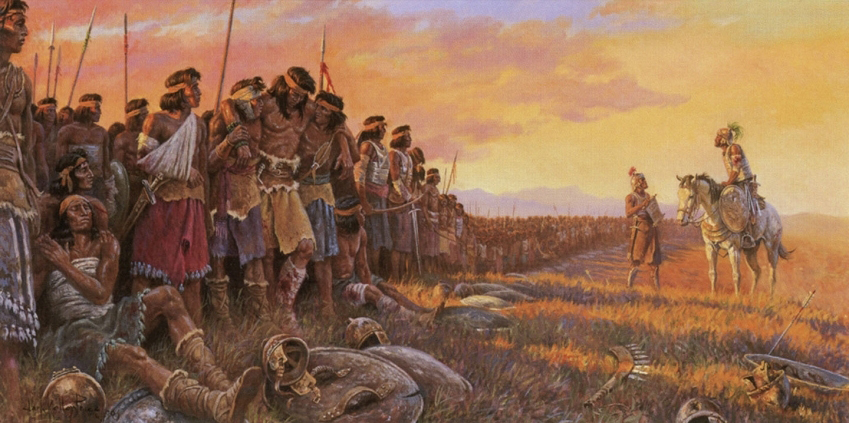
26. Book of Mormon prophets often welcomed war as a means of bringing wayward souls to repentance and bringing out strength of character in the righteous.
False. Book of Mormon prophets abhorred war. But they recognized the necessity of defending one’s family, freedom, and religion when attacked. Nonetheless, the record makes clear that war did have the effect of softening the hearts of some and making them more receptive to the Lord. On the other hand, others were hardened by the experiences of conflict and became even less amenable to the Lord’s direction than before. (See Alma 62:41.)
27. The Nephites were never happier, prior to the coming of Christ, than they were during the sixteen-year war with the Lamanites detailed in the last chapters of Alma.
True. Strange as it may seem, “there never was a happier time among the people of Nephi” than during a brief lull in their sixteen year conflict with the Lamanites, even though Amalickiah had recently sworn to drink Moroni’s blood, and his troops were continuing preparations for still another attack on the people of Nephi (Alma 50:23). Clearly, Nephite prophets viewed happiness as a function of inner righteousness rather than external conditions.
28. The Book of Mormon teaches that peace and war cannot exist simultaneously.
False. During the same sublimely happy period mentioned above, the record states “there was continual peace among them,” notwithstanding the Lamanite threats and the ongoing preparations for war on both sides (Alma 49:30). Inner peace in times of war sometimes included an inspired assurance to the righteous that the Lord would deliver them in a particular crisis. Helaman recorded, “Yea, and it came to pass that the Lord our God did visit us with assurances that he would deliver us; yea, insomuch that he did speak peace to our souls, and did grant unto us great faith, and did cause us that we should hope for our deliverance in him” (Alma 58:11).
29. The Book of Mormon equates the Spirit of God with the Spirit of freedom.
True. Pahoran uses those very words in Alma 61:15.
30. The American continent still retains the promise of freedom and divine protection if its inhabitants will keep the commandments of the Lord.
True. Moroni said it best: “Behold, this is a choice land, and whatsoever nation shall possess it shall be free from bondage, and from captivity, and from all other nations under heaven, if they will but serve the God of the land, who is Jesus Christ” (Ether 2:12). In fact, the very reason for the coming forth of the Book of Mormon, Moroni told his latter-day gentile readers, was “that ye may know the decrees of God– that ye may repent, and not continue in your iniquities until the fulness come, that ye may not bring down the fulness of the wrath of God upon you as the inhabitants of the land have hitherto done” (Ether 2:11).
Summary
With inspired foresight concerning conditions which would face their latter-day readers, the writers of the Book of Mormon hoped that their own experiences, including experiences with war, could help. Returning to the four questions posed at the beginning of this article concerning when war is justified, what rules govern its righteous conduct, what can enable the righteous to win a war, and what effects the righteous can and cannot expect from war, we find the Book of Mormon offers clear answers to each.
While the righteous will never begin a war, except at the direct command of God, they are not only permitted but expected to fight in defense of their lives, liberty, families, religion, and even property if an aggressor cannot otherwise be deterred. They are expected to fight reluctantly, however, never enjoying bloodshed. If possible, they are to take prisoners rather than take life. Prisoners are to be treated civilly and released when it is safe to do so.
Though the Lord’s people should regret the necessity of fighting, once the necessity is apparent, they are expected to exert themselves with sufficient energy to win. The Nephites recognized the necessity of producing both weapons and armor, fortifying their cities, raising troops, providing them with adequate provisions, and using the best military strategy they could devise in addition to living worthy of divine aid in their military endeavors.
The Nephites recognized that while a righteous nation will always be protected from annihilation, righteous individuals can and do perish in battle. They took consolation, however, in the fact that such “have died in the cause of their country and of their God, yea, and they are happy” (Alma 56:11). They knew that even in times of turmoil and conflict it was possible to enjoy an inner peace and happiness through righteous living.
Nephite prophets knew that in the latter days there would be wars and rumors of wars on an unprecedented scale. They knew that the only hope the latter-day inhabitants of their land would have to escape the fate of the Nephites and Jaredites would be to keep the commandments of the Lord, whose promise to the ancients has never been revoked: “Inasmuch as ye shall keep my commandments ye shall prosper in the land; but inasmuch as ye will not keep my commandments ye shall be cut off from my presence” (2 Nephi 1:20).
While the Nephite record clearly teaches the need for defensive preparations, it teaches with equal clarity that the size of a military force and the number and sophistication of its weapons is neither a guarantee of victory for the possessor nor sufficient cause for opponents to despair. In light of current world conditions and the prophetic picture for the future, it is obvious that the message of the Book of Mormon, including its lessons concerning warfare, has never been more urgently needed than today.
